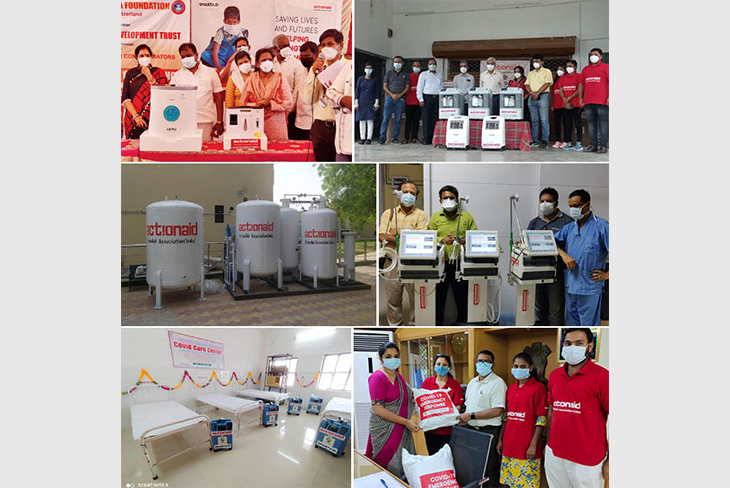Saving Lives, Rebuilding the Future
ActionAid Association is doing its best to strengthen public health infrastructure in the country. We are doing this with the efforts of thousands of community volunteers, leaders and social organisations; the solidarity support from individuals, foundations and corporate bodies; and the collaboration of administration and personnel in charge of primary health centres, community health centres and public hospitals. For example, oxygen has emerged as a critical need amid the COVID-19 pandemic. We have handed over nearly 6,500 oxygen concentrators to community health centres and public hospitals across more than 170 districts in 16 states to meet this need. Additionally, we have set up an oxygen plant in the COVID Care Centre in Noida Stadium; this would benefit several patients at this 50-bed centre. Recently, we supported the district administration in Bahraich, Uttar Pradesh, to set up an oxygen plant at Maharishi Balark Hospital. We also handed over three non-invasive ventilators for use at Techno DAMA Hospital in Kolkata, West Bengal.
We have been providing wide-ranging medical supplies to medical establishments, including oximeters, thermometers, PPE kits, sanitiser, face shields, surgical masks and gloves. In addition, our volunteers, through their tireless service, are supporting several healthcare institutions. For example, in Odisha, our volunteers supported five COVID Care Centres in Kandhamal district. The responsibility of monitoring these centres, including providing support in food distribution, ensuring regular sanitisation, and conducting health check-ups and counselling, was taken up by our volunteers. As of July 15, we have facilitated 23 COVID Care Centres across Andhra Pradesh, Bihar, Gujarat, Odisha, Rajasthan and Uttar Pradesh.
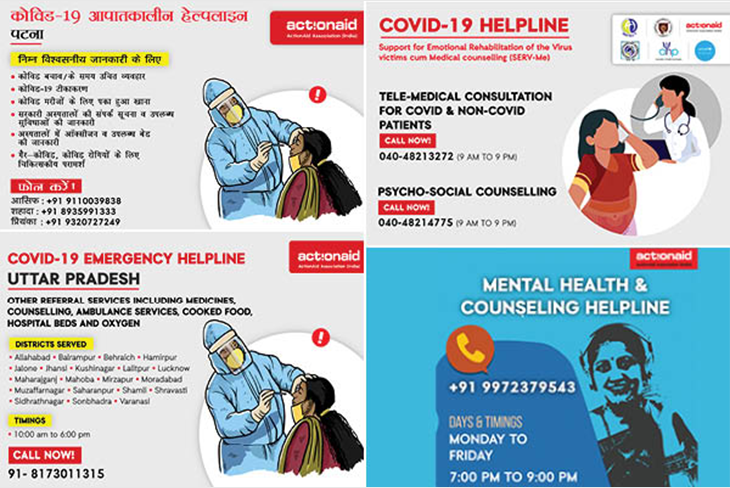
Providing Authentic Information through COVID-19 Helpdesks
Recognising the need for prompt and authentic information about facilities available at the various hospitals, we set up COVID-19 emergency helpdesks across districts. Through 81 helpdesks catering to a total of 90 districts, we provided contact numbers of nearby hospitals, and updated information on the availability of beds, oxygen cylinders and critical medicines. In addition, these helpdesks equipped the callers with awareness regarding vaccination and COVID-appropriate behaviour. Over a total of 34,019 phone calls, our helplines could benefit nearly 33,000 people.
We informed callers about protocols related to quarantining, local ambulance services and availability of cooked food services. In addition, some helplines, run with medical professionals, provided tele-medical consultation and psycho-social counselling to COVID and non-COVID patients.
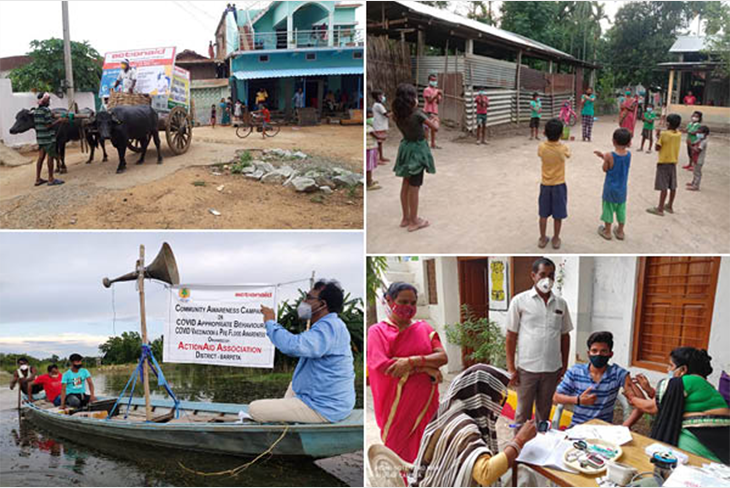
Running COVID-19 Awareness Drives | Facilitating Vaccination
The second wave of the pandemic engulfed even the rural areas and remote locations across the length and breadth of the country. As several superstitions and myths prevail and there is a lack of access to critical pandemic-related dos and don’ts, the communities in these areas need to be sensitised.
Our teams across states, using local dialects and traditionally popular modes of communication, generated awareness on containing the spread of the infection. Through autorickshaws, vans, sachetanata rathas and even bullock carts and boats, our community-based volunteers carried messages on the norms to be followed from village to village and basti to basti. Radio jingles were also put together and played over community radios to maximise the reach of the messaging.
In addition to adhering to these norms, we urgently needed to inform people about the importance of COVID-19 vaccination. Our field teams encountered several instances of vaccine hesitancy prevalent among communities based on rumours and unscientific beliefs. Our teams and volunteers played an instrumental role in busting several myths. Our awareness campaigns on COVID-appropriate protocols and the need for vaccination could reach out to nearly 15 lakh people in 150 districts. Besides, we helped several of them get registered for vaccination. Through our vaccine outreach efforts, we ensured the vaccination of 70,623 people from the most marginalised communities.
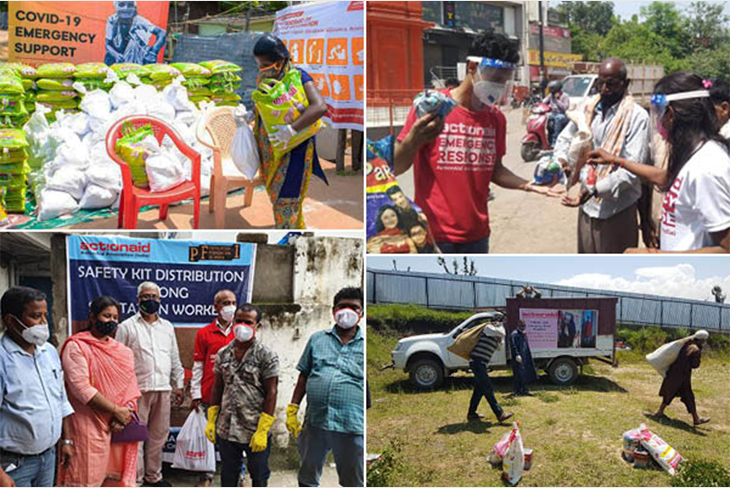
Distributing Relief Material and COVID Care Equipment
Given the livelihood and income losses suffered by people dependent on the informal economy, we immediately reached out to those most vulnerable with relief material. We provided dry rations – comprising cereals, pulses, oil and spices – to 36,092 families across 89 districts of the country to help them get through at least a month. We also distributed more than 64,000 cooked meals in 13 districts.
Recognising the need for immediate cash support for those most disadvantaged, we provided cash to a total of 1,378 individuals, focusing on women-headed households and single women, sex workers, persons with disability and the elderly.
Furthermore, our teams distributed sanitation kits – comprising masks, soaps, sanitisers, detergent and sanitary napkins – among 31,342 families across 55 districts of India to ensure their access to essential safety material amid the pandemic. We also provided facemasks, face shields and gloves to thousands of people in need. Besides, we supported volunteers helping in cremation services and other frontline health workers with PPE kits.
As part of our emergency response, our volunteers also supported the district administration of Koraput, Odisha, helping in terms of registration of returnee migrants and providing them with food and water. Two such relief camps were also run in Purnia, Bihar, where we provided food and medicines to thousands of migrants reaching these camps.
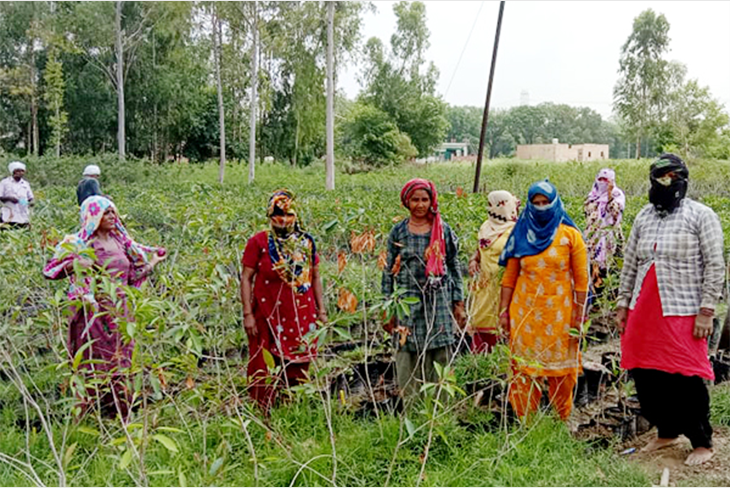
Building Safer and Empowered Communities
Just as in the first wave of the pandemic, we focused our interventions across states during the second wave to strengthen women and children’s agency among those most marginalised. During this period, our teams across states helped prevent 214 child marriages, besides rescuing 103 children from child labour and 31 children from getting trafficked. In addition, we addressed a total of 133 cases of violence against women during this phase.
Given the socio-economic distress resulting from the pandemic, we also recognised the urgent need of linking excluded communities with government schemes and entitlements. Through their consistent efforts, our state teams supported 4,65,256 individuals across 56 districts of the country to access work under Mahatma Gandhi National Rural Employment Guarantee Act (MGNREGA). In addition, we supported more than 4 lakh elderly people access old-age pension, nearly 2 lakh widows access widow pension schemes, and more than 61,000 persons with disability get disability pension. Our teams across 70 districts were also able to link 24,46,512 families with Public Distribution System (PDS) during this period.
* All data on outreach as of July 15, 2021
